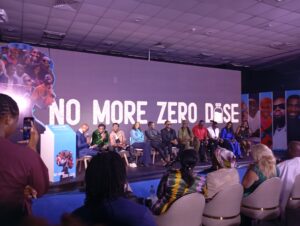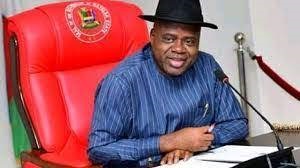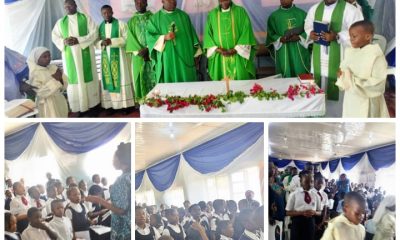NEWS
Immunisation: UNICEF Launches Song Entitled No More Zero Dose

As part of efforts to increase child immunisation awareness in Nigeria, the United Nations Children’s Fund (UNICEF) has launched a song entitled No More Zero Dose.
The song features UNICEF ambassadors and music stars from Nigeria, Mali, Chad, Cameroon, and Guinea.
They include Nigeria’s Cobhams Asuquo, Waje, Master Soumy, Sekouba Bambino, Stanley Enow, Mawndoe, Spyro, Timi Dakolo, Omawumi, Qing Madi, Kate Henshaw and Ali Nuhu.
At the event at Lekki, Lagos State, UNICEF Country Representative, Cristian Munduate, said that under-vaccination remained a pressing issue in Nigeria.
According to Munduate, the launch is a call to action, especially for Nigeria.
“The release of the No More Zero Dose song featuring 12 talented artistes from across West and Central Africa, eight of whom are from Nigeria, reflects the deep commitment to ensuring that every child receives life-saving vaccines.
“Music is a powerful tool for change, and through this collaboration, we are amplifying the message that no child should be left behind when it has to do with life-saving vaccines,” she said.
Mrs Ibijoke Sanwo-Olu, Wife of Lagos State Governor, commended UNICEF for commitment to child immunisation.
She urged stakeholders to strengthen Nigeria’s health care system and expand immunisation coverage.
Mrs Sanwo-Olu described the occasion as special, noting that it coincided with the world Polio Day.
“This is symbolising resilience, dedication and collaboration of stakeholders, from the government to international organisations, healthcare workers and local communities.
“The day is dedicated to the global effort to protect our children from polio and other preventable diseases. Nigeria has made a remarkable progress in tackling the issue.
“However, our journey is not yet complete. There remain many children who are not fully immunised, leaving them at a risk of diseases that can be prevented.
“Today’s launch is not just a celebration or a showcase of music. It is a call to action,” she said.
The governor’s wife urged collective efforts in creating awareness about the need for complete child immunisation.
Gilles Fagninou, the Regional Representative of UNICEF, Western Central Africa, said that every child deserved a healthy start in life.
Fagninou added that children had the right to vaccines that could protect them against diseases; hence, the passion to inspire action and awareness through music.
He said: “We are immensely proud of this collaboration that have brought together voices of talented musicians and UNICEF ambassadors to advocate complete immunisation coverage.
“Today’s event is a celebration of music, a celebration of love, a commitment to love, a powerful call to action. We are here because every child deserves a healthy start in life.
“Music is universal, transcends borders, goes beyond languages, breaks barriers, and speaks about our emotions.
“The music has amplified a message that is critical to the well-being of children across the region. We need more action.”
Asuquo, a UNICEF Champion and music producer, urged more people to join the movement to complete vaccination of children against preventable diseases.
“Together, we have the power to protect every child’s future and eradicate these diseases, join us in this mission and let us spread hope and health across Africa.
“Let us work to ensure that every child receives the vital vaccine they deserve, protecting their future and our world,” he said.
Gov. Babajide Sanwo-Olu of Lagos State said that collaboration between Lagos State and global partners such as UNICEF had been pivotal in ensuring that every child would be protected againt preventable diseases.
Gov. Sanwo-Olu who was represented by Mrs Olukemi Ogunyemi, his Special Adviser on Health, said that immunisation was not just a health issue but a matter of social justice and equity.
“We are empowering individuals, families and communities to take responsibility for the health of our children.
“Polio, once a threat to billions, is now close to being eliminated; thanks to the devoted efforts of health workers, government agencies and international partners.
“Our administration will continue to strengthen our healthcare system, invest in community outreach, health education and partnerships that ensure no child is left behind,” he added. (NAN)
NEWS
Otu Proposes N498bn for 2025 Budget
From Ene Asuquo, Calabar
Cross River State Governor, Senator Bassey Otu has proposed the sum of N498bn as the state’s budget for the 2025 fiscal year.Presenting the proposal at the State House of Assembly, Otu attributed N328 billion (66%) to Capital Expenditure and N170bn (34%) to Recurrent Expenditure.
A further breakdown earmarked N100 billion for Infrastructure, N81bn for Education, N25bn for Health, while N20bn was set aside for the Judiciary. ”House of Assembly N18bn, Aviation N16bn, Special Duties/Intergovernmental Affairs N15bn, Power N14 billion, Agriculture N11bn, Tourism N5bn, Science, Technology and Innovation N4.7bn, Women Affairs N3.7bn, Information N3bn, and others N181.6bn,” the Governor revealed.The Governor outlined Federal Allocation, Grants from International Organizations, and Internally Generated Revenue (IGR) as major revenue sources to fund the 2025 budget.”The 2025 Budget, like the previous year’s budget, is benchmarked on Sustainable Development Goals (SDGs). The decision to continue with the SDG benchmark is to guarantee continuity of projects and programs that may not be completed in this current budget cycle. This necessitated the need to roll over to the 2025 fiscal year.”For this reason, we have deliberately placed emphasis on SDG 9 – Industry, Innovation and Infrastructure; SDG 4 – Quality Education; SDG 3 – Good Health and Well-being; SDG 2 – Zero Hunger; as well as SDG 16 – Peace, Justice, and Strong Institutions,” Otu stated.He informed Cross Riverians that his administration’s adherence to strict financial prudence had placed the state as the ninth best state out of the 36 states in the 2023 Fiscal Performance Ranking, adding that “These indices have gone to confirm that development is not a linear achievement; rather a multidimensional process, where our progress is not measured solely by economic indicators, but by various dimensions interconnected to contribute to the overall well-being of the citizenry.”While reassuring the citizens that his administration’s policy preferences are meant to snowball into the common good of the people, the Governor also thanked the leadership of the State House of Assembly for building a common consensus among members to cooperate with the Executive and Judiciary Arms of Government to achieve a prosperous Cross River State.NEWS
Diri Presents N689.4bn to Assembly for 2025 Fiscal Year

From Mike Tayese, Yenagoa
Bayelsa State Governor, Douye Diri on Thursday presented a total budget of N689,440,348,916.30 christened Budget of Assured Prosperity for the 2025 fiscal year.Diri who made the presentation during plenary of the Bayelsa State House of Assembly, said that implementation of the 2025 Budget will require some level of efficiency and synergy in government activities across ministries, departments and agencies.
Giving the expenditure breakdown of the budget in some of the sectors, Governor Diri said the sum of N178, 761,880,407. 32 was budgeted for Works and Infrastructure; Education N47,111,696,198.40 and Sports N37,850,000,000,00.Others are Urban and Housing Development N13,680,000,000.00; Energy and Power N14,450,000,000.00; Agriculture N16,650,000,000.00; Security N19,000,000,000.00; Health N19,194,188,466.00 and Community Development N10,200,000,000.00.The governor also noted that the overall outcome of the 2025 budget will significantly depend on the level of fiscal and recurrent policy coordination, adding that it was the desire of the prosperity government to pursue a robust development as enunciated in the Assured budget.He said, “We have consciously crafted this 2025 budget in such a manner that we are mobilizing funds for human and capital infrastructural development initiatives, covering the seven core areas of the Assured Agenda which are Agricultural rural revolution and blue economy; sports and youths development; security and peace; urban renewal and rural development; robust health care delivery; energy generation; economic growth and tourism; diversified education towards innovation and technology by ensuring that our recurrent expenditure is kept within limits”.Highlighting some of the projects and programmes executed under the 2024 budget of N489,433,632,374.32 an supplementary budget of N270,800,000,000.00, Diri said his administration has embarked on the continuation of the three senatorial roads, construction of internal road in Yenagoa, building of technical colleges in all local government areas, grants to tertiary institutions, economic welfare and wage award for civil servants and training of youths in agriculture for food security.NEWS
FG Moves to Address Disjointed Women Programs with WEE National Policy
From Jude Dangwam, Jos
The Federal Government was to harmonize disjointed Women programs across the country with coordinating policy that streamline national programs for women from the federal to the state, down to local government areas and the Wards levels across the country.The Permanent Secretary Federal Ministry of women Affairs, Amb Gabriel Taminu Aduda said the government through the federal ministry of Women Affairs was determined to have a coordinated policy with a national program that are targeted at Women Economic Empowerment (WEE) in the country to be domesticated across the 36 states of the federation and the FCT.
Aduda stated this during the ongoing 24th Regular National Delegates Conference of Council of Women held in Jos the Plateau State capital.He said the moves became necessary considering the fact that disjointed programs have over the years not yielded the desired results leaving a large number of women in abject poverty across the nation.The Women Economic Empowerment policy is aimed at focusing on Women in Agriculture, looking at how the policy will support women farmers in gaining access to land and resources to help women improve their agricultural skills and productivity, and set specific programs to expand market access for women in agriculture across the country.He further maintained that the core sectoral interventions in the policy document will covers, “Women in Agriculture, Women in Entrepreneurship, Women in the, Traditional Labour Market, Women in Emerging Industries, Women’s Education and Skill Acquisition”The Permanent Secretary noted that the conference also seeks to find out what are the main challenges states face in domesticating the WEE policy and possibly look at how they can be addressed.The Director, Economic Services Department; Federal Ministry of Women Affairs, Blessing Amunike noted that the gathering is to come up with policies that empower Nigerian women through the National Policy on Women’s Economic Empowerment (WEE).She stressed that the main aim is to have the policy domesticated and implemented in the 36 States of Nigeria and the FCT that will create a series of activities by women at all levels.The founder and Managing Director of Eden Venture Group handling the communication aspect of the WEE policy, Fifehan Osikanlu maintained that through awareness campaign and advocacy on the domestication of the national policy, more women will be strengthen and armed with the requisite knowledge of the policy to make decisions that will impact on their lives directly.”This policy targets gender gaps that prevent women from reaching their full potential, particularly in financial inclusion, education, digital access, and economic participation.”Despite women making up 49.3% of Nigeria’s population, they face significant economic barriers. 70% of women are extremely poor, 45% of women have access to financial services while 56% are men. Women perform 70-80% of agricultural labour, but only 10% own land.”In education, 53% of girls complete secondary school compared to 67% who are boys. While in the digital access space, 34% of women have internet access compared to 54% who are men. The gender wage gap has women in Nigeria earning 45% less than men in similar roles as only 1 in 5 Board Members of Nigerian companies are women.” She lamentedPanelists at the engagement reiterated that the country suffered over the years and in recent times especially in the area of food production because of lack of coordinated policies and programs that will equip women in agriculture, Entrepreneurship among others.












